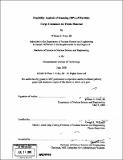Feasibility analysis of scanning 100% of maritime cargo containers for fissile material
Author(s)
Foley, William E., III
DownloadFull printable version (8.049Mb)
Other Contributors
Massachusetts Institute of Technology. Dept. of Nuclear Science and Engineering.
Advisor
Dwight L. Williams.
Terms of use
Metadata
Show full item recordAbstract
On August 3, 2007, President George W. Bush signed into law H.R. 1: Implementing Recommendations of the 9/11 Commission Act of 2007. The law mandates that 100% of air and maritime cargo must be scanned prior to entering the United States, and has been deemed unfeasible by many opponents. The analysis contained in this thesis shows that it is much more feasible for a major port to absorb the huge initial investments and operating costs than a smaller port. A port shipping 750,000 TEUs annually would charge a tax of $49.48 for ten years to recover their initial investment, while a port shipping 150,000 TEUs annually would need to charge $123.52 annually. This number rises exponentially as volume shipped drops. Furthermore, a port that is willing to invest in the developing technologies will be able to handle scanning of 100% of maritime cargo with minimal delays. Using current technology would result in delays of over 80,000 hours annually. However, investing in four next generation scanning machines would result in delays of only 560 hours annually. Finally, there exists a variety of political and logistical barriers that must be overcome. I recommend that in all circumstances, the United States retain control and oversight of all scanning operations in order to maintain quality control and throughput times. When weighed against the potential destruction of nuclear terrorism, this law is feasible for any port that is able to make the initial investment. A nuclear weapon would be destructive to both the U.S. and the country of origin, which should convince anyone that the benefits outweigh the costs.
Description
Thesis (S.B.)--Massachusetts Institute of Technology, Dept. of Nuclear Science and Engineering, 2008. Includes bibliographical references (leaves 58-61).
Date issued
2008Department
Massachusetts Institute of Technology. Department of Nuclear Science and EngineeringPublisher
Massachusetts Institute of Technology
Keywords
Nuclear Science and Engineering.